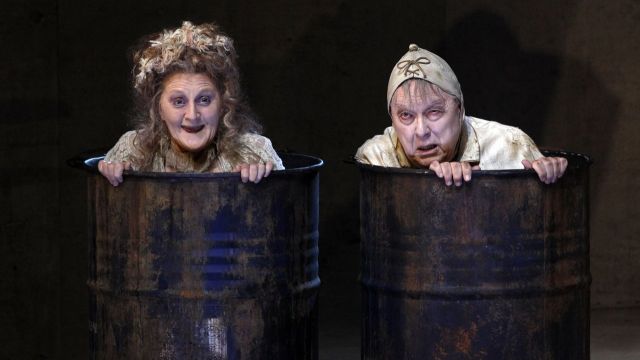Endgame
There is a moment in Beckett’s play about the “End of Days” where blind, wheelchair bound Hamm says “I was never there. It all happened without me,” and we should feel the pain of self -awareness in our chest at the realisation that we spend most of our lives disengaged from life itself, until it is too late and there is nothing left. We SHOULD – but we don’t, and that’s the weakness with this production. We don’t feel anything.
It’s true to say that Beckett himself did not impose his emotions (which he seems almost autistically oblivious to) upon his plays, but that doesn’t mean that his characters don’t have them. What makes Waiting for Godot such a delicious experience is the warmth between Vladimir and Estragon, both dependent on and supportive of the other. The playwright steps aside to allow the characters to connect without his interference. The result is marvellous entertainment if you have good actors, and a sensitive director. Theatre is, first and foremost, obliged to entertain …hopefully (in drama) through truth and clarity. It is not, cannot be, simply an intellectual exercise. If it doesn’t entertain, it fails.
Director Sam Strong clearly loves the language but has given little, if any, weight to connection between the characters. They don’t engage….not with the audience, not with each other, and there’s the problem. Beckett, an existential absurdist, let his characters speak for him without getting in the way. It’s not rocket science…in fact, the delicious performance by Julie Forsyth as Nell, Hamm’s mother who has no legs and lives in a rubbish tin, reminiscing about the past, proves that one can be funny and moving, poignant and real even in the most frighteningly absurd circumstances while waiting for death.

“Nothing is funnier than unhappiness, I grant you that… Yes, yes, it's the most comical thing in the world. And we laugh, we laugh, with a will, in the beginning,” she tells us. “But it's always the same thing. Yes, it's like the funny story we have heard too often, we still find it funny, but we don't laugh any more.” That’s life….life may be immutable, the end of it inevitable, but our reaction to it isn’t, and that’s what Beckett is interested in. Forsyth understands that – the end may come with resignation, even relief – but it doesn’t come without emotion. She is quite marvellous.
Colin Friels (Hamm) and Luke Mullins (Clov) seem to have missed the point of the relationship. The love/hate connection between the two is missing; they are simply strangers inhabiting the same space. Mullins (who is a much better actor than he appears here) is lumbered with the very precise stage directions that the Beckett Estate imposes, but it’s all played grudgingly and laboured with no lightness. We don’t care about Clov for a moment and so we disengage, or rather, don’t even engage in the first place. Hamm has the power in this power game…and yet I have seen this played to far more effect when the power game shifts between the two….first Hamm, then Clov…it is, after all, a chess game….and they’ve been playing it for years. And every game is different in nuance and reaction. Strong has drained the relationship of any blood. These two men are strangers – they don’t know or care about each other. And yet, the truth is there in Hamm’s story, told to Nagg (his father, also in a rubbish bin) played by Rhys McConnochie as a simpering slug of a creature who has resorted to infancy as a way of dealing with his end. In those moments Friels comes alive and reminds us why we love him as an actor. But it isn’t enough…Hamm returns to being one dimensional, a cripple both emotionally and physically. These four people, going through the motions while waiting for the end, know each other intimately, and while they wait through each interminable day they die a thousand tiny deaths….as Nell tells us, “We still find it funny, but we don't laugh any more.” Nevertheless, we still feel, as indeed Nell does. When Clov talks about Mother Pegg’s death to Hamm, it’s as if neither of them actually knew her, when in fact they would have known her for years. The only way that can matter to the audience is if we understand that connection between the people who inhabit this crumbling world.
Callum Morton gives us a grey concrete bunker of a set which could work well in different circumstances, but it simply overpowers this production, whilst at the same time doing nothing.
Many find Beckett impenetrable …I have never done so until now. When the play debuted in 1957, I was just reaching my teens, and the cold war was newly upon us. The idea of a nuclear holocaust was terrifying to everyone, yet there seemed a familial connection between Beckett’s characters (when I studied the play 3 years later) which was reassuring. The little things that connect us continue…and life goes on and on…and on, until one day - it doesn’t.
Hamm echoes Christ’s words on the cross when he says “It is finished” ….unfortunately 105 minutes is too long to wait.
Coral Drouyn
Photographer: Jeff Busby
Subscribe to our E-Newsletter, buy our latest print edition or find a Performing Arts book at Book Nook.

